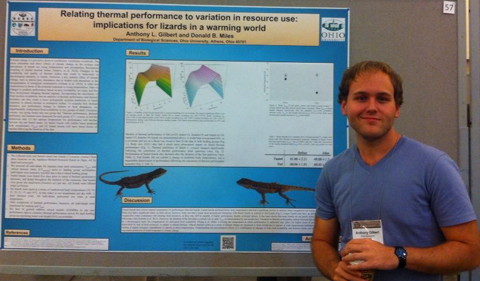Biological Sciences graduate student Anthony L. Gilbert presented a paper on “Relating Thermal Performance to Variation in Resource Use: Implications for Lizards in a Warming World” at the 2014 Joint Meeting of Ichthyologists and Herpetologists July 30 to Aug. 4 in Chattanooga, TN.
His co-author was Dr. Donald B. Miles, Professor of Biological Sciences at Ohio University.
Abstract: Understanding how climate change will impact lizards requires the understanding of how two ecological factors will change: habitat availability and resource use. Climate change is expected to alter the usable thermal environment available for lizards such that many areas will be rendered unsuitable for population persistence and growth. However, a less-examined aspect of the impacts of climate change details how a warming climate will impact resource (i.e. food) availability and use by lizards. Climate change has resulted in shifts in arthropod phenology, and these changes in prey availability and density have consequences for predator ecology and performance. By examining lizard thermal performance in relation to varying food resources, we can examine how performance at warming temperatures is impacted by declining food availability as a result of climate change or habitat alteration. Thus, integrating these two facets of climate change research results in the clearest depiction of how and why lizards will respond to climate change. Here, we analyze the thermal performance of adult Urosaurus ornatus in response to variation in food availability by experimentally manipulating access to food. If the optimal temperature for performance declines with decreasing resource saturation, then lower abundance of prey items coupled with warming temperatures could lead to significant physiological and behavioral shifts in lizards as a result of climate change.




















Comments